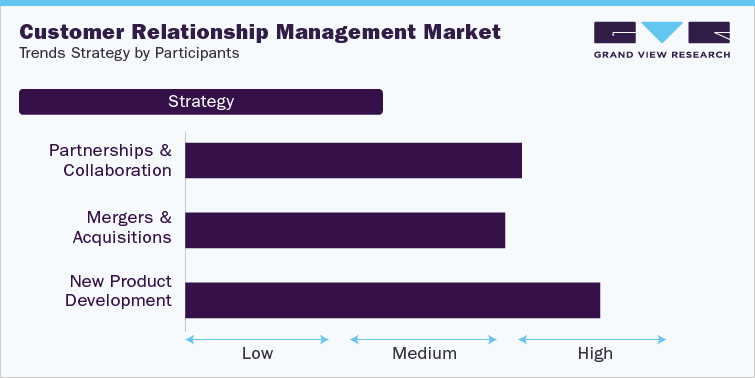The global customer relationship management industry size was valued at USD 51.43 billion in 2022 and will witness 16.9% CAGR from 2023 to 2030, according to the “Customer Relationship Management Industry Data Book, 2023 – 2030,” published by Grand View Research. Industry leaders have sought state-of-the-art technologies, including AI, automation, and IoT to enhance customer relationship management (CRM) strategies. AI chatbots have garnered traction to streamline workflow and enhance interaction with customers. Prominently, an unprecedented rise in the digital footprint, along with the expanding smartphone penetration, has emphasized the significance of CRM tools.
CRM has become invaluable for increased customer loyalty and improved customer satisfaction, bolstering the footfall of customer self-service software. The demand for automated live chat tools has reinforced the value proposition as millennials and the Gen Z population increasingly prefer social channels, mobile, and the web to fulfill purchases.
Rising Footprint of Customer Self-Service Software
Omni channel self-service channels have fueled the penetration of personalized and seamless brand experience, prompting investment in the landscape. For instance, the self-order and checkout kiosks for picking up orders at the counter have become prevalent to provide an unparalleled experience. The customer self-service software market size stood at USD 11.92 billion in 2022 and will exhibit a healthy CAGR of 23.5% during the forecast period. With consumers depicting profound traction for self-service technology, stakeholders are slated to bolster their technologies to boost customer experience.
Stakeholders Shift Focus on Digital Experience Platform
The soaring number of internet users and the expansion of digital touchpoints and channels have spurred the footfall of digital experience platforms (DXPs). The platform has emerged as a viable portfolio to provide real-time, connected, and personalized customer experience. In essence, DXP has gained prominence in the e-commerce sector to foster payment gateways and digital stores. The digital experience platform market size garnered USD 11.17 billion in 2022 and could depict a significant CAGR of 13.7% during the assessment period. The bullish growth trajectory is primarily attributed to the demand for seamless digital experience, better personalization, and content flexibility.
Why is Sales Training Software here to stay?
Lately, sales training software has been received across end-use industries, including healthcare, automotive, logistics & transportation, and retail & e-commerce. In essence, gamification, on-demand sales training, micro-learning, and continuous reinforcement have brought a paradigm shift in the training landscape. For instance, retailers have sought advanced sales training software to streamline sales operation management. Retailers are using the software to save time spent on training employees.
Accordingly, cloud-based tools are poised to gain ground across emerging and advanced economies. Some factors, including remote coaching and low maintenance costs, have encouraged service providers to augment their value proposition. However, data privacy concerns are likely to challenge the stakeholders. Amidst potential data issues with cloud-based CRM, incumbent players are expected to count on on-premise CRM solutions. A notable uptick in data breaches and privacy issues with the cloud has compelled leaders to invest in the portfolio.
Industry leaders are likely to cash in on the following dynamics and trends to tap into the global market:
- Sales force automation software has become the mega-trend to augment productivity, offer smart reporting, and enhance sales efficiency.
- End-users have sought marketing automation solutions to boost leads, personalize customer journeys, deep dive into behavioral tracking, and use data for smart decisions.
- Robust adoption of smart technologies will underpin the industry’s growth. Prominently, bespoke solutions are used in cars to assess driver’s behavior better.
- Asia Pacific could witness investment galore in the wake of the emergence of 5G networks across China, India, and Japan. Furthermore, the growth of cloud computing and big data will lead to the adoption of CRM software. Besides, the expanding footfall of machine learning and artificial intelligence will bode well for Asia Pacific CRM industry growth.
North America to Stay Cut Above the Rest
Well-established and emerging players envisage the U.S. and Canada to be the happy hunting grounds against the backdrop of notable use of CRM tools in sales, marketing, and customer service. Brands have banked on state-of-the-art social CRM solutions to gain insights into social media posts and assess brand sentiments.
North America could contribute significantly to the global CRM industry with surging demand to automate, track, and optimize customer interactions across retail, BFSI, telecom, government, and healthcare sectors. Leading players are likely to explore opportunities for CRM in the e-commerce industry to personalize marketing and provide better customer care. The bespoke solutions will continue to be sought to address customer experience, supply chain offerings, business networks, and procurement processes.
Navigating Stakeholders’ Strategies
The competitive landscape indicates industry leaders could emphasize investments in organic and inorganic strategies to tap into the global landscape. In doing so, forward-looking companies are poised to inject funds into innovation, partnerships, R&D activities, product and service launches, and mergers & acquisitions.
The bullishness of AI across business verticals has prompted stakeholders to seek potential growth opportunities in CRM. To illustrate, in March 2023, Microsoft announced the launch of Microsoft Dynamics 365 Copilot, offering AI-powered assistance to every line of business. The next-gen AI updates will enable businesses to use CRM and ERP to enhance business outcomes and expedite innovation.



Leave a Reply